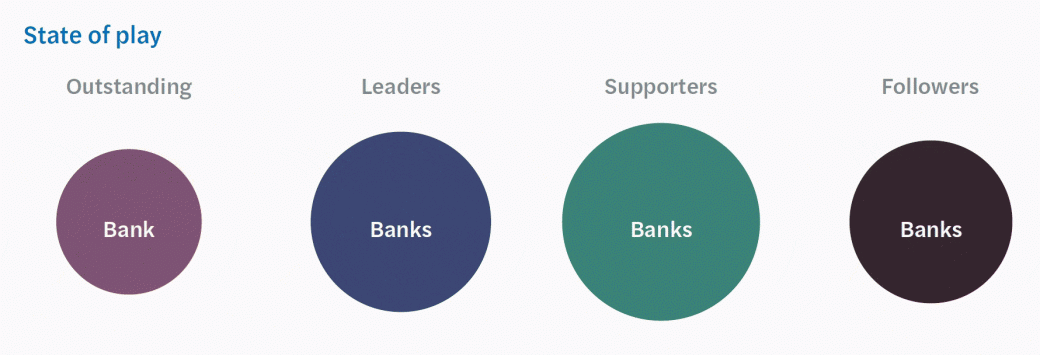However, a recent Mazars benchmark study finds full implementation of practices designed to achieve sustainability objectives remains a work in progress. ‘Responsible banking practices: benchmark study 2020’ assesses the sustainability practices of 37 of the world’s largest banks based in Europe, Africa, the Americas and Asia-Pacific.
See key findings and figures from the study below.
More leaders, fewer followers
The study ranks the 37 banks into four categories: outstanding, leaders, supporters and followers. It is encouraging to see one bank ranked as outstanding, achieving a positive score in more than 95% of the criteria set in our assessment. It is also remarkable to see more banks rank as leaders and supporters compared to last year’s findings, and fewer (just seven) rank as followers.
Improvements across all areas
Comparing the recent results with our 2019 assessment, banks have made progress across all of the sustainable finance dimensions analysed:
- There has been an increase in the percentage of banks that foster a culture of sustainability and have updated their governance structures accordingly (51% increase).
- An increased percentage of banks now align their disclosures with ESG reporting standards (45% increase).
- There are lags in areas such as embedding ESG and climate criteria into risk management frameworks and implementing strategies for sustainability (22% and 20% increase, respectively).
Massive increase in sustainable culture and governance
Most of the banks assessed foster a culture of sustainability and allocate responsibility for this to senior management functions.
- 74% of banks have now implemented measures that foster a culture of sustainability and adapted their governance structure, compared to 49% last year.
PACTA guides banks to Paris Agreement objective
The Paris Agreement Capital Transition Assessment (PACTA), developed by five leading global banking groups, continues to help banking institutions steer their credit portfolios towards the Paris Agreement goals. More than half of the banks adopt this methodology to meet the Paris Agreement objective.
- 51% of banks are piloting the PACTA methodology to align their financial portfolios with the Paris Agreement goals.
Overall progress made across the world
While French and UK banks lead on culture and governance, strategy, and the development of responsible product offering, Asia-Pacific banks perform particularly well with respect to their responsible product offering.
- 90% of French and UK banks are implementing measures to foster a culture and governance for sustainability;
- 88% of banks in Asia-Pacific are developing responsible services and products.
Less than a quarter of banks evaluate climate change risks
With growing recognition of the financial stakes, rising external pressures and regulation, banks strive to adopt risk management practices that are more advanced for climate-related risks. However, the exact financial impact remains challenging to measure due to a lack of quantitative information.
- Only 22% of banks assessed provide quantitative data on the materiality of climate risks.
Disclosure of financed emissions remains a weak point
Most of the banks assessed in our benchmark study implement sustainability reporting standards, mostly focused on climate objectives, with the most commonly used being Carbon Disclosure Project (CDP) and Task Force on Climate-related Financial Disclosures (TCFD). However, a key reporting challenge remains Scope 3 GHG emissions.
- Only 11% of banks disclose matters in relation to their financing activities.
Corporate offering far more mature than individual offering
Most of the banks have a corporate offering that is more mature than the offering for individuals, and climate and environmental products are more prevalent than economic and social products. Overall, the development of retail products and a lack of standardised reporting frameworks remain a challenge.
- 78% of banks have developed a green bond offering, whereas only 32% have developed green products for individuals.
On the road to COP26
Building momentum towards COP26 - set to be hosted by the UK in Glasgow in November 2021 – banks continue to demonstrate an increased commitment to making their practices more sustainable.
The findings of our study are encouraging, but they also reveal the work that remains to be done. It reaffirms how strong sustainability practices often come hand-in-hand with consistent industry guidelines and requirements provided by local regulators and governments.
As we look forward to COP26, we will continue to monitor market developments and uncover best practice for responsible banking. In doing so, we hope to shed light on how to build resilient, post-pandemic businesses and how to shape a sustainable future for the global economy.



